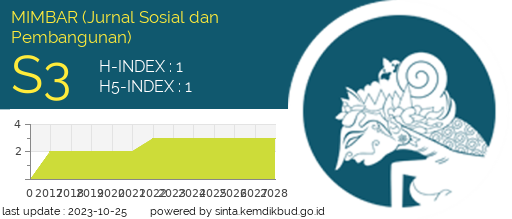Exploration of Social Networks on Cultural Resilience in the Cirebon City
DOI:
https://doi.org/10.29313/mimbar.v39i1.2117Keywords:
social networks, cultural resilience, cityAbstract
As happened in Cirebon City, Indonesian culture faces the challenges of technological and scientific development that can erode or enrich the culture itself. Previous studies have shown that social networks affect economic and business resilience and this study identifies how social networks affect cultural resilience. This study concludes social networks influence increasing cultural resilience through the existence of common goals, sharing knowledge and resources, and creating innovations in the arts and culture. Maintaining and preserving culture as part of the identity and capital of urban development is a common goal of the palace and the city government. These factors underlie a culture that can survive and go hand in hand with the development of technology and science. The three palaces in Cirebon City play a major role in maintaining culture. The results of this study provide lessons for other regions and enrich studies related to the influence of social networks on the resilience and development of cities.
References
Asamoah, D., Agyei-Owusu, B., & Ashun, E. (2020). Social network relationship, supply chain resilience and customer-oriented performance of small and medium enterprises in a developing economy. Benchmarking, 27(5), 1793–1813. https://doi.org/10.1108/BIJ-08-2019-0374/FULL/HTML
Barnes, J. A. (1969). Graph theory and social networks: A technical comment on connectedness and connectivity. Sociology, 3(2), 215–232. https://doi.org/10.1177/003803856900300205
Bodin, Ö., Crona, B., society, H. E.-E. and, & 2006, undefined. (2006). Social networks in natural resource management: what is there to learn from a structural perspective? JSTOR.
CB Wesson -. (2013). Rumors of our demise have been greatly exaggerated: Archaeological perspectives on culture and sustainability. Mdpi.Com, 5, 100–122. https://doi.org/10.3390/su5010100
Fadli, M. (2020). Peran Modal Sosial dalam Pendidikan Sekolah. Equlibrium: Jurnal Pendidikan, 8(2), 152–161. https://doi.org/https://doi.org/10.26618/equilibrium.v8i2.3363
Flint, R. (2004). The sustainable development of water resources. Water Resources Update, 127, 48–59.
Gunnestad, A. A. (2006). Resilience in a cross-cultural perspective: How resilience is generated in different cultures. Journal of Intercultural Communication, 11. https://open.dmmh.no/dmmh-xmlui/handle/11250/2564077
Krippendorff, K. (2009). The content analysis reader (M. A. B. Klaus Krippendorff, Ed.). SAGE Publications.
Leopold, J., & Tylor, E. (1980). Culture in comparative and evolutionary perspective: EB Tylor and the making of" Primitive culture". Berlin Dietrich Reimer Verlag.
Martin, R., & Sunley, P. (2015). On the notion of regional economic resilience: Conceptualization and explanation. Journal of Economic Geography, 15(1), 1–42. https://doi.org/10.1093/jeg/lbu015
Muñoz-Erickson, T., Miller, C., Forests, T. M.-, & 2017, U. (2017). How cities think: Knowledge co-production for urban sustainability and resilience. Mdpi.Com. https://doi.org/10.3390/f8060203
Prell, C., Hubacek, K., Quinn, C., & Reed, M. (2008). ‘Who’s in the Network?’ When Stakeholders Influence Data Analysis. Systemic Practice and Action Research, 21(6), 443–458. https://doi.org/10.1007/s11213-008-9105-9
Rochman, G. P. (2019). Pengelolaan Kota melalui Jejaring Sister City: Kasus Studi dari Indonesia. ETHOS: Jurnal Penelitian Dan Pengabdian Kepada Masyarakat, 7(2), 200–209. https://doi.org/10.29313/ETHOS.V7I2.4526
Rochman, G. P., & Hudalah, D. (2020). How do leadership factors spur the success of sister-city cooperation? Journal of Physics: Conference Series, 1469(1), 012032. https://doi.org/10.1088/1742-6596/1469/1/012032
Rochman, G. P., Indratno, I., & Agustina, I. H. (2021). Rural Agri-Food Industry Resilience in Indonesia. IOP Conference Series: Earth and Environmental Science, 830(1), 012063. https://doi.org/10.1088/1755-1315/830/1/012063
Taguchi, N. (2018). Description and explanation of pragmatic development: Quantitative, qualitative, and mixed methods research. The system, 75, 23–32. https://doi.org/10.1016/j.system.2018.03.010
Van Essen, M., Strike, V. M., Carney, M., & Sapp, S. (2014). The Resilient Family Firm: Stakeholder Outcomes and Institutional Effects. Wiley Online Library, 23(3), 167–183. https://doi.org/10.1111/corg.12087
Widodo, H. T. (2016). Peran dan manfaat modal sosial dalam peningkatan efektivitas kerja karyawan sektor usaha mikro kecil dan menengah di sentra kerajinan tas dan koper Tanggulangin Sidoarjo. JBMP (Jurnal Bisnis, Manahemen Dan Perbankan), 2(1), 1–14. https://doi.org/https://doi.org/10.21070/jbmp.v2i1.911
Downloads
Published
Issue
Section
License
Copyright (c) 2023 MIMBAR : Jurnal Sosial dan Pembangunan

This work is licensed under a Creative Commons Attribution-NonCommercial-ShareAlike 4.0 International License.














